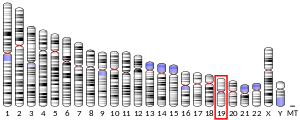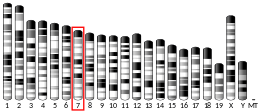NAPSA
Napsin-A is an aspartic proteinase that is encoded in humans by the NAPSA gene.[5] The name napsin comes from novel aspartic proteinase of the pepsin family.[6]
The activation peptide of an aspartic proteinase acts as an inhibitor of the active site. These peptide segments, or pro-parts, are deemed important for correct folding, targeting, and control of the activation of aspartic proteinase zymogens. The pronapsin A gene is expressed predominantly in lung and kidney. Its translation product is predicted to be a fully functional, glycosylated aspartic proteinase precursor containing an RGD motif and an additional 18 residues at its C-terminus.[5]
Utility
Detection of NAPSA gene expression can be used to distinguish adenocarcinomas from other forms of lung cancer.[7]
References
- GRCh38: Ensembl release 89: ENSG00000131400 - Ensembl, May 2017
- GRCm38: Ensembl release 89: ENSMUSG00000002204 - Ensembl, May 2017
- "Human PubMed Reference:". National Center for Biotechnology Information, U.S. National Library of Medicine.
- "Mouse PubMed Reference:". National Center for Biotechnology Information, U.S. National Library of Medicine.
- "Entrez Gene: NAPSA napsin A aspartic peptidase".
- Tatnell, Peter J; Powell, David J; Hill, Jeffrey; Smith, Trudi S; Tew, David G; Kay, John (11 December 1998). "Napsins: new human aspartic proteinases". FEBS Letters. 441 (1): 43–48. doi:10.1016/s0014-5793(98)01522-1. PMID 9877162.
- Ueno T, Linder S, Elmberger G (2004). "Aspartic proteinase napsin is a useful marker for diagnosis of primary lung adenocarcinoma". Br. J. Cancer. 88 (8): 1229–33. doi:10.1038/sj.bjc.6600879. PMC 2747556. PMID 12698189.
Further reading
- Koelsch G, Mares M, Metcalf P, Fusek M (1994). "Multiple functions of pro-parts of aspartic proteinase zymogens". FEBS Lett. 343 (1): 6–10. doi:10.1016/0014-5793(94)80596-2. PMID 8163018.
- Blundell TL, Guruprasad K, Albert A, et al. (1998). "The aspartic proteinases. An historical overview". Adv. Exp. Med. Biol. 436: 1–13. doi:10.1007/978-1-4615-5373-1_1. PMID 9561193.
- Chuman Y, Bergman A, Ueno T, et al. (2000). "Napsin A, a member of the aspartic protease family, is abundantly expressed in normal lung and kidney tissue and is expressed in lung adenocarcinomas". FEBS Lett. 462 (1–2): 129–34. doi:10.1016/S0014-5793(99)01493-3. PMID 10580105.
- Schauer-Vukasinovic V, Bur D, Kling D, et al. (2000). "Human napsin A: expression, immunochemical detection, and tissue localization". FEBS Lett. 462 (1–2): 135–9. doi:10.1016/S0014-5793(99)01458-1. PMID 10580106.
- Yan R, Bienkowski MJ, Shuck ME, et al. (1999). "Membrane-anchored aspartyl protease with Alzheimer's disease beta-secretase activity". Nature. 402 (6761): 533–7. Bibcode:1999Natur.402..533Y. doi:10.1038/990107. PMID 10591213.
- Cook M, Bühling F, Ansorge S, et al. (2002). "Pronapsin A and B gene expression in normal and malignant human lung and mononuclear blood cells". Biochim. Biophys. Acta. 1577 (1): 10–6. doi:10.1016/s0167-4781(02)00400-1. PMID 12151090.
- Strausberg RL, Feingold EA, Grouse LH, et al. (2003). "Generation and initial analysis of more than 15,000 full-length human and mouse cDNA sequences". Proc. Natl. Acad. Sci. U.S.A. 99 (26): 16899–903. Bibcode:2002PNAS...9916899M. doi:10.1073/pnas.242603899. PMC 139241. PMID 12477932.
- Brasch F, Ochs M, Kahne T, et al. (2004). "Involvement of napsin A in the C- and N-terminal processing of surfactant protein B in type-II pneumocytes of the human lung". J. Biol. Chem. 278 (49): 49006–14. doi:10.1074/jbc.M306844200. PMID 13129928.
- Ota T, Suzuki Y, Nishikawa T, et al. (2004). "Complete sequencing and characterization of 21,243 full-length human cDNAs". Nat. Genet. 36 (1): 40–5. doi:10.1038/ng1285. PMID 14702039.
- Innocenti M, Zucconi A, Disanza A, et al. (2004). "Abi1 is essential for the formation and activation of a WAVE2 signalling complex". Nat. Cell Biol. 6 (4): 319–27. doi:10.1038/ncb1105. PMID 15048123.



